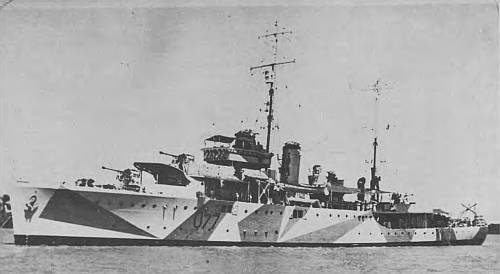- Author
- Duffy, Monsignor C.J.
- Subjects
- None noted
- Tags
-
- RAN Ships
- None noted.
- Publication
- August 1972 edition of the Naval Historical Review (all rights reserved)

He was assigned to convoy duty in the dangerous waters of Singapore immediately prior to the fall of that so-called impregnable bastion. While Radio Tokyo was announcing to the world that no further ships would bring relief to the port, Yarra formed part of an escort to several ships of which the converted luxury liner Empress of Asia, with 2,500 crack British troops on board, was one. It was a prize target for Japanese bombers and submarines which concentrated on Banks Straits, known as Bomb Alley. On February 4 came the first attack which failed. A day later, however, bombs from a second squadron scored a hit on the first class saloon of the liner and set it on fire. The bridge was damaged and the blazing and helpless ship was drifting towards a minefield.
While the cruiser Danae attended to prowling submarines the Yarra approached the troopship and attached herself to the port side with strong lines, permitting the soldiers and crew to swarm across. Those cut off by the flames jumped overboard to be picked up by the boats. While the bombers made for the double target, Yarra’s guns gave them a hot reception and brought down three of them. Two thousand men crammed the decks so tightly that orders came from the bridge for the men to stay put for fear of capsizing the sloop. Forty-four lives were lost altogether, but Yarra crawled safely into Singapore with the remainder.
A month later there was a different outcome. On February 27 the sloop formed part of an escort to a convoy on its way from Batavia to Tjilitap on the south coast of Java, but the port fell to the Japanese before they arrived. Three vessels, the depot ship Anking, an oil tanker and a minesweeper were diverted from Java under the care of Yarra. The destination was Australia, and it was to be a race for survival.
On March 3rd, Yarra stopped to pick up 40 survivors from a Dutch ship. A day later, when 375 miles south of Java, the lookout sighted a number of warships sailing north towards the convoy. Shells from three eight-inch cruisers and four destroyers soon showed the ships were enemy.
After laying a thick smoke screen over her charges, Yarra turned to make contact with the attackers at their centre. Her four inch guns and a few three pounders had little chance of delaying the enemy but she sped ahead. Ninety shells exploded around her before the first hit killed almost all in the sick bay. Keeping out of range, the Japanese scored another hit on the bridge, and two more hits on the guns and the engine room. Lieutenant Commander Rankin ordered ‘Abandon Ship’. His ship now lay dead and helpless in the water. The Captain went to his cabin to destroy papers and was never seen again.
HMAS Yarra was of a stubborn breed and refused to die. The Japanese pounded her torn hull with their superior guns but she refused to sink. Dive bombers were called in eventually and at last she rolled over and slipped beneath the sea. Out of her complement of 151 men 33 got away on two Carley floats, two rafts and a length of planking. For more than four days they drifted, being gradually reduced in numbers to 13 as privation and sharks took their toll. These were rescued by an extraordinary chance. A Dutch submarine, K11, had got away from Singapore and for 400 miles dodged the relentless pursuit of ships and aircraft. Only once did the captain dare to bring the submarine to the surface during daylight hours, in order to recharge batteries. It was then he sighted the 13 survivors of Yarra. The lucky thirteen were taken to Colombo.
I conclude this paper with a quotation from a letter written by Lieutenant Commander Rankin on 20th February to Victor Roach:
‘I would like to write ‘Prepare’ all over the Continent, in every home, farm, business, means of transport and most of all in the factories which produce armaments. I am fit and well and ready for whatever may befall. Care weighs rather heavily tonight, but also do they weigh heavily on those charged with the defence of our country and Empire. It is easy to be critical but we in our service are doing our best under difficulties we did not anticipate. And we shall carry on trying to stave off the horrors of war from our people. But it behoves every man at home to be up and doing to provide bases not only for defence, but to carry the war into the enemy’s territory, which is the only place where it can be won.’




